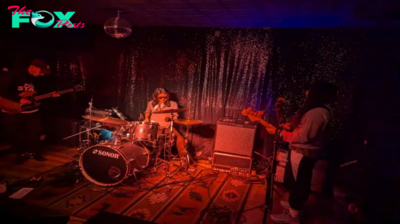Entertainment
AMERICAN THEATRE | Black Out: An Ongoing Nationwide Motion of Viewers Curation
Jeremy O. Harris (second from proper) on the Black Out night time efficiency of “Slave Play” on Broadway.
What does it take for Black audiences to really feel at house within the theatre? This query looms over producers at predominantly white establishments as they hope to encourage folks to return to the theatre following Covid-19’s shuttering impression. Playwrights Dominique Morisseau and Jeremy O. Harris have been on the helm of a grassroots motion with a promising reply: Black Out nights.
In 2017, when Morisseau’s play Pipeline was heading to Lincoln Heart Theater, the solid expressed discomfort at performing “in-the-house stuff”—materials that particularly speaks to the Black expertise—“in entrance of Lincoln Heart’s very white viewers.” Due to the play’s references to the school-to-prison pipeline and the adultification of Black kids, they requested assurance that the systemic disparities centered in Pipeline wouldn’t be mirrored in who had entry to take a seat within the viewers. “I promised them that will not be what they see each time they appear out in the home,” Morisseau recollects.
A lot has been written in regards to the methods Black viewers members’ behaviors have been policed within the theatre, from criticizing their hair to discouraging vocal call-and-response. Morisseau’s husband, J. Keys, instructed that she create one thing referred to as Black Theatre Night time to foster the sense of church, a household reunion, and different areas the place Black audiences felt wholly welcome. Tapping into her community, Morisseau despatched emails for a number of affinity nights, together with ones for Asian, Latine, and younger audiences, with various ranges of success. “I used to be making an attempt to show one thing to Lincoln Heart at the moment about, for those who go to the folks they’ll come, , and everyone has an viewers,” Morisseau stated.
When Harris’s provocative Slave Play hit Broadway in 2019, he had the same mission, and extra assets. With groundbreaking success, the present’s producers crammed 804 seats of Broadway’s Golden Theatre with an all-Black-identifying viewers Harris dubbed Black Out Nite. The complete homes provided a hopeful answer to what the manufacturing’s dramaturg, Amauta Marston-Firmino, described as “an actual shortage drawback within the American theatre that creates a stage of gate-keeping that retains artists and audiences away.” Harris efficiently repeated this mannequin when Slave Play had its L.A. premiere at Heart Theatre Group.
Now Black Out performances are filling homes throughout the nation. At Atlanta’s Actor’s Categorical, affiliate creative director Amanda Washington hosted one for her manufacturing of Erika Dickerson-Despenza’s cullud wattah. “With a purpose to be inclusive, I’ve to be unique,” Washington defined. She’s planning one other in June for the theatre’s manufacturing of Pearl Cleage’s Blues for an Alabama Sky. Morisseau deliberate two for her run of Sundown Child at Signature Theatre in New York earlier this 12 months. However she needs producers to know that internet hosting a Black Out night time is a step, not the top purpose, which ought to be to assist Black-led theatres.
“Don’t disrupt white American theatre by diversifying audiences and switch a blind eye to Black theatre,” Morisseau says. “You should not have to be within the binary of selecting.”
Dalyla Nicole (she/her) is an Atlanta-based playwright and dramaturg.
Associated
-

 Entertainment34m ago
Entertainment34m agoHow ‘Interior Chinatown’ Satirises Asians in Hollywood with Witty Social Commentary
-

 Entertainment11h ago
Entertainment11h agoHow to See Ava, Chiang Mai Night Safari’s Golden Tiger
-

 Entertainment11h ago
Entertainment11h agoDictionary.com Names ‘Demure’ as Its Word of the Year for 2024
-

 Entertainment13h ago
Entertainment13h agoAnna Delvey Reunites With Ezra Sosa and Flips Him Off Ahead of ‘Dancing With the Stars’ Finale Return
-

 Entertainment16h ago
Entertainment16h agoMethods to Recharge as an Actor
-

 Entertainment16h ago
Entertainment16h agoWeak Sign: October 4, 2024 Tubby’s
-

 Entertainment16h ago
Entertainment16h ago‘Gladiator II’ Ending Breakdown: Did Lucius Realise Maximus’ Dream of Rome?
-

 Entertainment22h ago
Entertainment22h agoGet to Know Bluesky, the New X Alternative with 18 Million Active Users





















